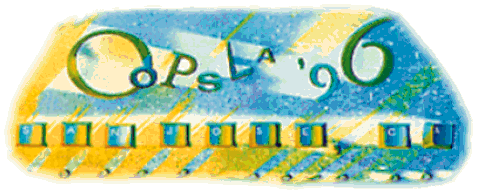
ACM SIGPLAN Notices
Vol. 31, No. 10 (Oct. 1996), Pages
214-231
in: OOPSLA '96. Proceedings of the eleventh annual ACM SIGPLAN conference on Object-oriented programming systems, languages, and applications,
October 6 - 10, 1996, San Jose, CA USA
[Abstract]
[Index Terms]
[Full Text in Gzipped PS Format, 83 KB]
[Full Text in PDF Format, 2348 KB]
[BibTeX Entry]

Abstract
The class of an object is not necessarily the only determiner of its
runtime behaviour. Often it is necessary to have an object behave
differently depending upon the other objects to which it is connected.
However, as it currently stands, object-oriented programming provides
no support for this concept, and little recognition of its role in
common, practical programming situations. This paper investigates a
new programming paradigm,
General Terms
Algorithms,
Design,
Languages
Categories and Subject Descriptors
Software -Programming Techniques - Object-oriented Programming (D.1);
Theory of Computation -Logics and Meanings of Programs - Studies of Program Constructs (F.3.3): Type structure;
Theory of Computation -Logics and Meanings of Programs - Studies of Program Constructs (F.3.3): Functional constructs;
Information Systems -Information Interfaces and Presentation - User Interfaces (H.5.2): Screen design;
Information Systems -Information Interfaces and Presentation - User Interfaces (H.5.2): Interaction styles;
Software -Programming Languages - Language Classifications (D.3.2): C++;
BibTeX Entry
@InProceedings{Gil:1996:EAN,
Author = {Joseph Gil and David H. Lorenz},
Crossref = {OOPSLA:96},
Pages = "214--231",
Title = {{E}nvironmental {A}cquisition -- {A} New Inheritance-Like Abstraction Mechanism},
Year = 1996,
}
---------- OOSPLA crossref begin ----------
@String{SIGPLAN = "Acm SIGPLAN Notices"}
@String{PROC = "Proceedings of"}
@String{OOPSLA = "Object-Oriented Programming Systems, Languages, and Applications"}
@String{PROC:OOPSLA96 = PROC#" the 11$^{th}$ Annual Conference on "#OOPSLA}
@String{OOPSLA96 = "OOPSLA'96"}
@Proceedings{OOPSLA:96,
ISBN = "0-201-92109-X",
Address = {San Jose, California},
Booktitle = PROC:OOPSLA96,
Key = OOPSLA96,
Month = oct#{ 6-10},
Organization = OOPSLA96,
Publisher = SIGPLAN#{ 31(10) }#Oct#{ 1996},
Title = PROC:OOPSLA96,
Year = 1996,
}
Published by the OOPSLA '96. Copyright © 1996 ACM,
Inc.
?